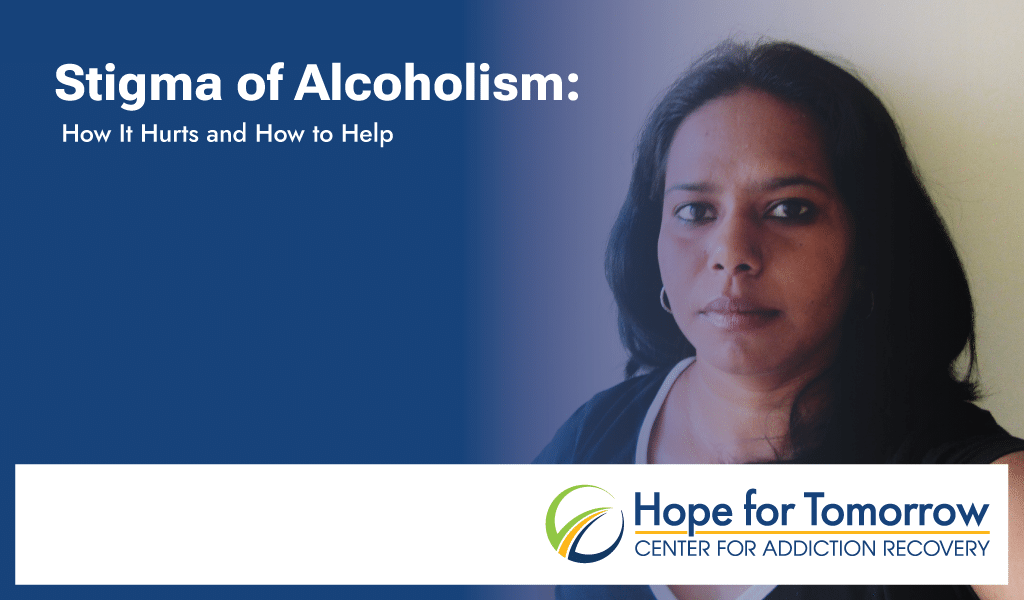

Everyone knows what it feels like to be judged.
It hurts. It’s embarrassing. It makes you second-guess yourself.
The 141,920 West Virginians with alcohol use disorder in 2022 know that feeling well – as does anyone with this highly stigmatized condition.
The stigma of alcoholism (alcohol use disorder) is strong and harmful. We’ve seen the damage it does firsthand at Hope for Tomorrow.
What exactly is stigma, and why is it so bad? How do we fight against it? Let’s answer those questions.
Chances are, you read that heading and already had a picture of “the standard alcoholic” in your head. Even if you have an alcohol use disorder yourself, and know very well that it’s more complicated – the standard society sets is hard to shake. You probably compare yourself to this image regularly.
Is the stereotype in your head a man? Maybe he’s a bit overweight, and he neglects his family in favor of drinking. He might be aggressive, and fall asleep in front of the TV every night with a beer bottle in his hand. He probably doesn’t have a job. He’s lost control of his life to alcohol entirely.
That’s who many people will think of – and that stereotype does apply to some real people. There are even more cases where the stereotype doesn’t quite fit, though.
In every case, the stereotype is harmful and reinforces stigma. This stereotype robs people with alcohol use disorder of their humanity and the compassion they deserve. It allows society at large to forget that these are real people who need help, in favor of labeling them as individuals who choose to be “lazy” or irresponsible. It simultaneously suggests that alcohol use disorder is a moral failing, while also insinuating people with this condition have no control over the power alcohol holds in their lives.
Thankfully, none of that is true – but thanks to the stigma of alcoholism (alcohol use disorder), too few people realize that.
Merriam-Webster defines stigma as “a set of negative and unfair beliefs that a society or group of people have about something,” or “a mark of shame or discredit.”
There are multiple types of stigma. The one people most frequently think of is public stigma. That’s the harmful, belittling attitude society – and most people – holds against something.
Structural stigma is also relevant. This is when laws and policies work against a group of people based on negative attitudes. Putting people with illicit substance use disorders in jail instead of treatment is an example of structural stigma.
Unfortunately, health practitioner stigma also exists. Some medical professionals look down on people with substance use disorders, seeing them more as people who made bad decisions than someone with a health condition.
All of this stigma contributes to something known as “self-stigma.” These are the negative attitudes you hold about yourself. Self-stigma contributes to low self-esteem and other mental health conditions and actually makes alcohol use disorder worse.

The damage caused by the stigma against alcohol use disorder is significant. Here’s why.
That stereotype of a person with alcohol use disorder is clear in everyone’s mind, whether you drink or not. Because of that, people who don’t fit the “standard profile” of someone with alcohol use disorder don’t always realize they have it. They’ll compare themselves to the stereotype, thinking, “Well, my drinking isn’t nearly that bad, so it’s fine.”
The truth is, plenty of people with alcohol use disorder still hold a job and have positive relationships with their families. Some of them can hide the extent of their drinking altogether. Stereotypes and stigma prevent people from getting the help they need.
With stigma comes judgment, and with judgment comes fear. People are afraid if others find out they’re getting help for their alcohol habits, that they’ll think less of them. They’ll think they’re irresponsible and lack self-control. Some people with alcohol use disorder might even worry people will think they’re stupid for making an “obviously bad decision.”
Then there’s the matter of healthcare professionals, who as we covered, aren’t always free of stigma either. People with alcohol use disorder are afraid their doctors will look down on them if they ask for resources to overcome their condition. Even some doctors treat alcohol use disorder like a moral failing instead of a health condition. That attitude doesn’t help anyone. Instead, it leaves people with alcohol use disorder feeling alienated, ashamed, and hopeless.
Stigma is embedded so deeply in our society that it’s often a knee-jerk reaction. When someone tells you they’re recovering from an alcohol use disorder, what do you think?
People who are in recovery or have a loved one in recovery often feel compassion, but self-stigma can rear its head in these cases, too.
“Why would they drink enough to develop an alcohol use disorder? They should’ve known better.”
“Recovery doesn’t always last. They could go back to old habits any time, so can I actually trust them?”
“If they had an alcohol use disorder, who knows what other bad choices they could make.”
These are all common judgments people pass due to the stigma against alcohol use disorder. It makes people in recovery reluctant and ashamed to share their stories, when overcoming alcohol use disorder is actually something to be proud of! These judgments are harmful and aren’t true.
Support is key to maintaining recovery. When someone managing an alcohol use disorder receives more judgment than kindness, it’s painful. That pain can remind them of why they used to drink, and lead them back to alcohol, especially if they don’t have healthy coping mechanisms.
In some cases, when people feel belittled enough, they’ll think, “Everyone thinks badly of me no matter what. What’s the point of trying so hard to avoid alcohol, then?” This also often causes someone to return to drinking.
The shame that comes with self-stigma can also be difficult to manage, even after recovery. Alcohol can once again become a way to cope with negative emotions, especially if the person in recovery doesn’t understand why they’re feeling that way. That’s frustrating and confusing, and it’s far too easy to drink so they don’t have to think about it anymore.
The best way to reduce stigma is by making alcohol use disorder less of a taboo topic. Talk about it more, and when you do, always use person-first language. That means highlighting the fact that people with alcohol use disorders are people, not their condition or a common stereotype. Instead of “alcoholic,” say, “person with an alcohol use disorder.” Instead of “alcoholism,” say “alcohol use disorder.” This highlights the fact that alcohol use disorder is a health condition, not a moral failing.
If you meet someone with an alcohol use disorder or in recovery, make sure to act with empathy. Keep in mind that it’s very common to have a stigma against alcohol use disorder, so if your first instinct or thought is judgment, that’s okay. It’s how you respond to that thought that matters. Remind yourself that you’re speaking to a complex person who needs support, and proceed accordingly.
If you’re in recovery from an alcohol use disorder, you have a major role to play, too. Serve as an example that people in recovery are far more than the stereotypes or labels society puts on them. Be kind, compassionate, hardworking, and disciplined. Keep attending your therapy sessions and keeping up with the practices that support your mental health. Share your story frequently and proudly. Sometimes, all a judgemental person needs to change their ways is exposure to a person who proves them wrong.
However, always prioritize your recovery. Even though you have a lot of power to fight against stigma, it isn’t your responsibility to change everyone’s minds. Trying to do that is exhausting, so never be afraid to step back and take care of yourself. Surround yourself with people who lift you up, and if someone is causing you a lot of pain, don’t be afraid to cut them off.

We’re mindful that people from all walks of life will read this blog. Maybe you’re currently living with an alcohol use disorder, and grappling with self-stigma. We know it’s hard, and we know it’s scary to seek help. We still encourage you to take the leap and reach out. Alcohol rehab can change your life.
You might be looking at Hope for Tomorrow’s website, wondering if you can trust us. Do we actually practice what we preach in this article? Yes. We pride ourselves on the judgment-free addiction recovery services we offer West Virginians. That includes people with additional health conditions, pregnant women, veterans, couples seeking treatment together, and everyone in between. We’re here for you, and ready to address every aspect of your alcohol use disorder so you can heal. Don’t just take our word for it, though – call us at 877-679-8162. We’d love to meet you and tell you what we’re all about.
Treatment today for a brighter tomorrow.